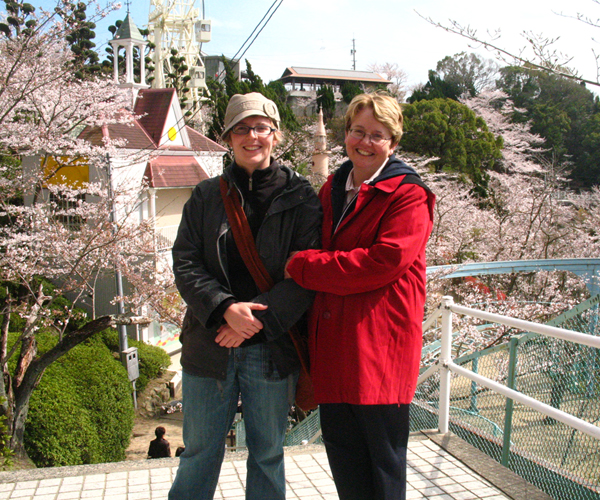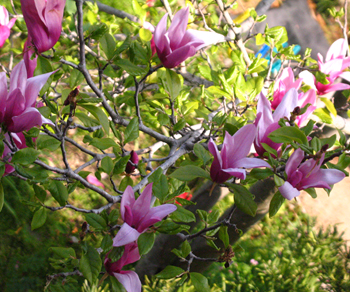 2007年、尾道に滞在中のジャッキーを訪ねた母親と、桜を楽しんだ。JACKIE HOFFART PHOTOS このコラムでは、ジャッキーが毎回あるお題について思うところ、考えていることをつづります。1回目のお題は「桜」。自然のありがたみを理解するきっかけは日本だった、とジャッキーは言います。
I love everything about spring. The wintery crispness in the air softens and the harsh sunshine mellows, warming your face on bright, blue-sky days that stretch into the evening. And brave little buds sprout on the trees that have seemed dead for so long.
It's the time to clean your house, to air out your thoughts and to dream big. Time to get outside, to appreciate nature and to reconnect with friends. It's time to plan, to hope, to fall in love. Spring is the season to come alive. And nothing exemplifies that as much as the cherry blossom.
The irony is that cherry blossoms come alive only to die soon after. But what a stunning life!

尾道に住んでいたころに部屋の窓から見えたモクレン
|
The giant pinky-white canopy of thick fluffy flowers makes even the most hardened person stop in their tracks and marvel. Ever since my first cherry blossom season in Japan, I've admired how much Japanese people take this to heart.
As evidence of how uniquely Japanese this celebration of the blossom is, take the word hanami. It's a hugely important cultural institution in Japan, and yet it's not possible to translate directly. "Have a picnic (party) under the blossoming cherry tree" is probably close, but it still doesn't indicate the importance of the event in Japan.
What I especially like is the tenderness of the idea behind hanami. We all get so wrapped up in our day-to-day routines that you can just blink and suddenly months, even years have gone by. But the short-lived exuberance of the cherry blossom demands your attention. And hanami is a way to acquiesce to nature; to stop and enjoy.
Another blossom that demands my attention in a different way around this time of year is the magnolia. When I lived on the mountainside in Onomichi, Hiroshima Prefecture, I had a magnolia tree right outside my window. I remember thinking it was the strangest and most beautiful blossom I'd ever seen. It was so chunky and rich, and it was always changing color. To me, magnolias are the anti-cherry blossom.
Where cherry blossoms are tiny, precise, delicate and graceful, magnolia blossoms are big, multilayered, bold and unpredictable. Both are beautiful in their own way, but they are spring's nonidentical twins.
I think of cherry blossoms as a kind of metaphor for Japan, a culture that celebrates precision, consistency and reliability. And magnolia blossoms become a stand-in for North America, a culture that celebrates spontaneity, exuberance and size.
There's an expression in English: "Be sure to stop and smell the roses." It means that a person should take a moment to appreciate the beauty of life. Despite this expression, I don't think my culture values the act of stopping to smell the flowers as much as it could. That's something Japanese people taught me. That's basically what hanami is about. I'm grateful to Japan for adding that layer of appreciation and humility in my life.
Taking a moment out of life to feel joy, the joy of being alive, the joy of having hope, the joy of hoping for a better tomorrow — this is one of the great gifts of the cherry blossom. Happy spring to you!
・・・・
Let me take a moment, in this spirit, to recognize and welcome you to my new column. I'm very happy to be able to start a new discussion with all of you Shukan ST readers.
This is the first installment in a new column where I give my thoughts or opinions on a certain topic, usually something timely, to stimulate interaction and discussion with you.
Think of this new column as a variety show, where I am the contestant and you are the host. You can ask me anything or suggest topics, and if my editor at the ST thinks it'll make a great column, she'll assign it to me and you will see it here in print.
My friends tease me that I think "too much," but I disagree. My mind is always turning over, thinking of things, analyzing, musing . . . I just have a lot of thoughts, not "too many." But I'm happy to share them with you, and learn some of yours too.
Next time: My topic is . . . fortune-telling
|





